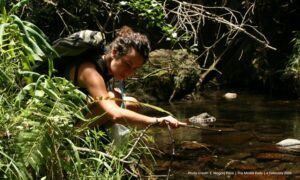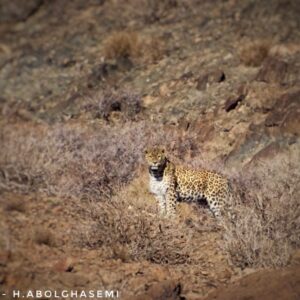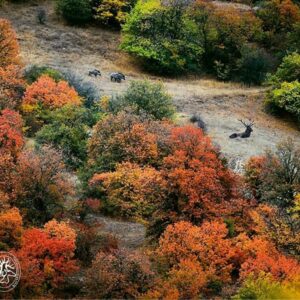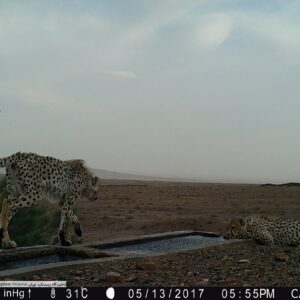Update
Release of Niloufar Bayani and Other Environmental Conservationists Detained in Iran
In January 2018, Niloufar Bayani and eight other environmental conservationists working for the Persian Wildlife Heritage Foundation were imprisoned and subsequently sentenced to lengthy prison terms. At the time of her arrest, Niloufar had been working in Iran for only 6 months, to monitor the critically endangered Persian or Asiatic cheetah. She was sentenced to 10 years and 4 months in prison.
Release of Niloufar Bayani and Conservationists Imprisoned in Iran
On the occasion of Iranian New Year and Eid al-Fitr, Ayatollah Khamenei has agreed to pardon or commute the sentences of 2,127 convicts upon a proposal by Iranian Judiciary Chief Gholmhossein Mohseni-Ejei. Four environmentalists – Sepideh Kashani, Niloufar Bayani, Houman Jowkar, and Taher Ghadirain – are included in the amnesty. Niloufar Bayani was released on Monday 8 April 2024, 2266 days after she was arrested, after more than 6 years in prison, and is now free with her family.
Arrest and Detention of Scientists of the Persian Wildlife Heritage Foundation
Mid-January 2018, the co-founder of the Persian Wildlife Heritage Foundation (Miras Parsian), Morad Tahbaz, was arrested. On 24 and 25 January 2018, 8 other Iranian scientists of the Persian Wildlife Heritage Foundation were arrested and accused of espionage on the basis of their wildlife conservation activities, including monitoring and protecting the Asian cheetah, one of the most endangered large cat species in the world.
- † Kavous Seyed-Emami | Iranian-Canadian sociologist and PWHF’s co-founder | Died in detention on 8 February 2018
- Taher Ghadirian | Released in April 2024
- Sam Rajabi | Released in December 2023
- Houman Jowkar | Released in April 2024
- Niloufar Bayani | Released in April 2024
- Sepideh Kashani | Released in April 2024
- Amirhossein Khaleghi | Released after spending the whole of his sentence in prison
- Morad Tahbaz | Released in September 2023
- Abdolreza Kouhpayeh | Released in 2020
Human rights organizations, such as Amnesty International and Human Rights Watch, have denounced the unacceptable conditions of their detention.
Persian Wildlife Heritage Foundation (PWHF)
The Persian Wildlife Heritage Foundation was founded in 2008 and operated with the permission of the Iranian government. This Tehran-based organization was using camera traps to monitor species such as the Persian leopard, Asiatic cheetah, Asiatic black bear, and Laristan wild sheep.
PWHF enjoyed long-running relationships with UN agencies, international NGOs, and grassroots conservation groups.
Niloufar Bayani
At the time of her arrest, Niloufar had been working in Iran for only 6 months, to monitor the critically endangered Persian or Asiatic cheetah. Despite the lack of evidence against their case, Niloufar spent 8 months in isolation and 1,200 hours of interrogation before being sentenced in February 2020 to ten years.
This young Iranian was bringing international expertise. She studied at McGill University in Montreal and Columbia University in New York and worked in Geneva between 2012 and 2017, as a consultant for the UN Environment Programme (UNEP). She had notably joined the UN teams on the ground after Hurricane Matthew hit Haiti. She had returned to Iran to serve her country and advance its biodiversity conservation.
She dared, during her trial and in letters addressed to the Iranian authorities, to denounce the torture she suffered. Held in the section reserved for female political prisoners, along with the recently released Franco-Iranian researcher Fariba Adelkhah, she has continued her environmental research and studies, giving seminars on climate change to increase awareness amongst her peers inside Evin prison on climate issues.
In June 2023, Scholars at Risk Network published an article and the manuscript ‘Climate Literacy in the Land of Oil: Interviews with female political prisoners in Evin‘ written by Niloufar between April 2022 and March 2023. In this piece, she surveys fellow prisoners on climate issues and explores potential reforms. Following Niloufar’s survey and research findings on climate literacy in Evin Prison, she and her fellow inmates developed a climate seminar series which was designed to increase awareness and knowledge about climate change, its impacts as well as mitigation and adaptation actions. One important output of this 9-week climate course was an Open Letter signed by women political prisoners in Evin calling for climate action in Iran.
Niloufar also published an article in the Etemad News, on 1 February 2023, where she reflects on the impacts of the COVID pandemic and the importance of changing our destructive relationship with nature.
When Niloufar worked for UNEP in Geneva, from 2012 to 2017, she was based at the International Environment House. She regularly contributed to activities of the Geneva Environment Network and other institutions in Geneva and around the world, leaving an excellent impression on all those she interacted with.
Hope with Iranian Amnesty
In light of the mass pardons issued in 2023 by Iranian authorities, there was opportunity to call for amnesty on Niloufar’s case and secure her release, and that of her fellow environmental conservationists detained in Iran.
Pressure was growing internationally and in Iran for these scientists to be included in it.
- UNEP renews plea for release of environmental conservationist Niloufar Bayani | UNEP | 13 February 2023
- Statement from UNEP Executive Director Inger Andersen | 13 February 2023
- IUCN renews call for release of Iran conservationists | IUCN | 14 February 2023
- Jane’s Letter on Iranian Amnesty | Jane Goodall | 14 February 2023
- Video message from the UN Special Rapporteur on human rights and the environment David R. BOYD
- Call for Release for Niloufar Bayani and her Fellow Environmental Conservationists | 14 February 2023
The world faces a triple planetary crisis and at this time we need everyone with the qualifications, experience and expertise, like Niloufar, to help protect this beautiful planet that we call home.
— David Boyd, UN Special Rapporteur on Human Rights and the Environment
Links
- IUCN welcomes release of conservationists imprisoned in Iran | IUCN | 16 April 2024
- UNEP welcomes the announcement of the impending release of four conservationists imprisoned in the Islamic Republic of Iran | UNEP | 7 April 2024
- Any Hope for Nature
- Call for release of Niloufar Bayani and environmental conservationists detained in Iran! | Petition on Change.org | 13 February 2023
- UNEP renews calls for Niloufar Bayani, 8 conservationists release from Iran | Bahle Gama | Eswatini Daily News | 14 February 2023
- Five Years Later, McGill Alum Niloufar Bayani Remains Detained in Iran | Nikki Bozinoff, Daniel Hoops, Jamie Lundine and E. Magda Price | 6 February 2023
- Environmental Human Rights Defenders | GEN Update
- Geneva Roadmap 40/11 for Environmental Human Rights Defenders
Credits
- E. Magda Price / The McGill Daily
- Persian Wildlife Heritage Foundation







